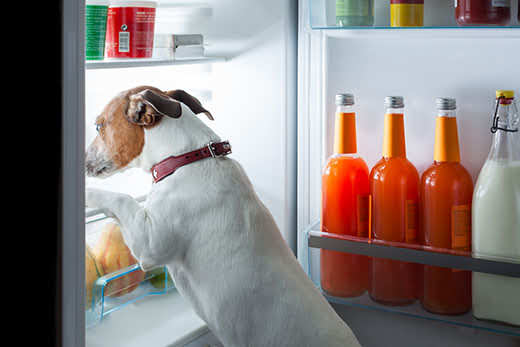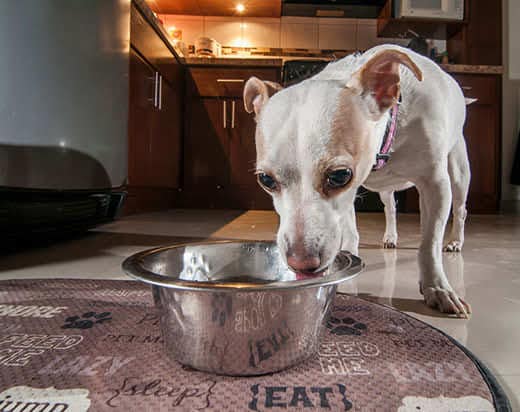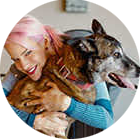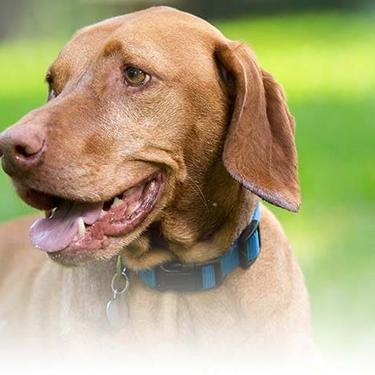
-
Find the right food for your pet
Take this quiz to see which food may be the best for your furry friend.
Find the right food for your pet
Take this quiz to see which food may be the best for your furry friend.
Featured products
 Adult Healthy Cuisine Roasted Chicken, Carrots & Spinach Stew Dog Food
Adult Healthy Cuisine Roasted Chicken, Carrots & Spinach Stew Dog FoodDelicious roasted chicken paired with tender vegetables in a succulent stew
Shop Now Adult 7+ Perfect Digestion Chicken, Whole Oats & Brown Rice Recipe Dog Food
Adult 7+ Perfect Digestion Chicken, Whole Oats & Brown Rice Recipe Dog FoodScience Diet's breakthrough nutrition supports ultimate digestive well-being & healthy microbiome for dogs age 7+
Shop Now Small & Mini Savory Stew with Chicken & Vegetables Dog Food
Small & Mini Savory Stew with Chicken & Vegetables Dog FoodA delicious complement to the nutrition of Science Diet Small & Mini 7+ dog food
Shop NowFeatured products
 Adult 7+ Senior Vitality Chicken & Vegetable Stew Cat Food
Adult 7+ Senior Vitality Chicken & Vegetable Stew Cat FoodImproves Everyday Ability to Get Up & Go
Shop Now Adult Savory Entrée Can Variety Pack Cat Food
Adult Savory Entrée Can Variety Pack Cat FoodPrecisely balanced nutrition with the delicious taste of savory minced chicken to help fuel the energy needs of cats during the prime of their life
Shop Now Adult 7+ Tender Tuna Dinner Cat Food
Adult 7+ Tender Tuna Dinner Cat FoodWith delicious chunks in a decadent gravy
Shop Now -
Dog
- Dog Tips & Articles
-
Health Category
- Weight
- Food & Environmental Sensitivities
- Urinary
- Digestive
- Joint
- Kidney
-
Life Stage
- Puppy Nutrition
- Adult Nutrition
- Senior Nutrition
Cat
- Cat Tips & Articles
-
Health Category
- Weight
- Skin & Food Sensitivities
- Urinary
- Digestive
- Kidney
-
Life Stage
- Kitten Nutrition
- Adult Nutrition
Featured articles
 Do Dogs and Cats have Belly Buttons?
Do Dogs and Cats have Belly Buttons?Learn whether cats & dogs have belly buttons like humans, what the function is, and if there are any health concerns associated with it.
Read More Does My Pet Hate Me?
Does My Pet Hate Me?Learn tips for bonding with your pet if you've ever thought, 'My dog doesn't like me, or 'Why do I have a standoffish cat?'
Read More Why Are Dogs and Cats So Cute?
Why Are Dogs and Cats So Cute?If waggy puppy dog tails and furry kitten yawns make you swoon, you're not alone. Why are cats so cute? And, dogs too! Let's find out!
Read More -


There you are in the kitchen, marinating the chicken you'd intended for dinner. You turn your back to reach for the fridge and next thing you know, the tray of chicken is on the floor and your dog is eating it.
You're now probably concerned about your dog after they ate raw chicken.
If you ever see this happen, restrain your dog by holding them from the collar or harness and then carefully remove any chicken from their mouth. If you find that your dog ate raw chicken, read on to learn why raw chicken isn't safe for dogs.
The Infectious Dangers of Eating Raw Chicken
Eating raw chicken can lead to infectious issues for humans, more so than other meats. And it's no different for dogs. Eating raw chicken falls squarely in the "not good for dogs" category as a result of these dangerous bacteria.
 Raw chicken meat can be a source of certain kinds of bacteria that can lead to gastrointestinal salmonella infections in both humans and dogs. In fact, up to 20% of chicks may test positive for salmonella, according to researchers at the University of Georgia as noted by News21.
Raw chicken meat can be a source of certain kinds of bacteria that can lead to gastrointestinal salmonella infections in both humans and dogs. In fact, up to 20% of chicks may test positive for salmonella, according to researchers at the University of Georgia as noted by News21.
While dogs are more carnivorous than humans and are therefore theoretically better at battling these bacteria, the risk still exists. Moreover, a dog who has never consumed raw meat and perhaps is not even accustomed to eating chicken is much less likely to tolerate a sizable meal of the stuff.
Finally, it's important to note that dogs who consume raw meat are more likely to shed dangerous bacteria in their stool. Even the most minute amounts may end up on bedding and other areas humans come into contact. These bacteria have been shown to be a risk for human household members, especially for the very young, elderly and immunosuppressed.
Other Dangers of Eating Raw Chicken
If you find yourself on the phone with your veterinarian explaining how your dog got into some raw chicken, you'll need to be aware of other potential dangers. Salmonella aside, how bad is eating raw chicken overall?
That answer probably depends on how much your dog ate relative to their size. A few licks of raw juice, for example, is enough to pass along any unwanted bacteria, but ingesting a whole carcass is much worse for a variety of reasons, particularly because of the bones and fat.
While raw bones tend to be easier to digest than cooked bones, a small dog may nonetheless suffer mechanical trauma to their digestive tract from eating all that tough stuff, even potentially experiencing a complete bowel obstruction. Meanwhile, large amounts of fat may lead to the same issues that happen when dogs eat gobs of fatty turkey during Thanksgiving — namely, the possibility of pancreatitis.


Tasty Tips
If My Dog Ate Raw Chicken, Are There Side Effects?
A few side effects associated with a dog eating raw chicken include:

- Vomiting or regurgitation: The dog's body may attempt to expel the material shortly after ingestion, especially if a large quantity was consumed. While unlikely to lead to gastrointestinal perforation, bones can traumatize the delicate lining of the stomach and esophagus.
- Diarrhea: Fluid and electrolyte loss from diarrhea is a major concern as it's the most common sign after raw chicken consumption. Soft stools are to be expected but unrelenting watery stools are a serious cause for concern.
- Dehydration: Electrolyte loss and dehydration may prove to be an issue if the vomiting is extensive or persists for a prolonged period of time, particularly for smaller dogs.
- Fever, loss of appetite and lethargy: These signs become more of an issue if salmonella or campylobacter is involved.
Most dogs who eat raw chicken recover without complications. While the rare dog may require long-term hospitalization for bacterial infections, most can avoid a hospital stay and will recover relatively quickly at home once medications and fluids are administered.
Should My Dog See a Vet?
In most small-volume ingestion situations, most vets are likely to recommend that you watch your dog carefully over the week following the ingestion for signs of vomiting or diarrhea. If these arise, or if large quantities were consumed, a vet visit is definitely in order.
If your dog is food motivated and can easily access food on a table or kitchen counter, it is a good idea to never turn your back on raw chicken ingredients when they're in the room. If you're cooking something especially yummy, like meats, consider keeping your dogs contained elsewhere. Better yet, find a no-reach spot in the kitchen for especially tantalizing ingredients so incidents like this never happen again.


Dr. Patty Khuly is an award-winning veterinarian known for her independent thinking, her spirited pet advocacy, her passion for the veterinary profession, and her famously irreverent pet health writing.
Dr. K is an honors graduate of both Wellesley College and the University of Pennsylvania School of Veterinary Medicine. She received her MBA at The Wharton School of Business as part of the prestigious VMD/MBA dual-degree program. She now owns Sunset Animal Clinic, a veterinary practice in Miami, Florida.
Related products

A delicious complement to the nutrition of Science Diet Small & Mini 7+ dog food

Science Diet's breakthrough nutrition supports ultimate digestive well-being & healthy microbiome for dogs age 7+

Delicious braised beef paired with tender vegetables in a succulent stew

Delicious roasted chicken paired with tender vegetables in a succulent stew
Related articles

Large and giant breed puppies have different nutritional needs than other dogs. Learn how to provide the special care they need to grow up big and strong.

Your dog's coat and skin are a big part of your dog's overall health. Ensure you keep your dog's coat healthy, by following these simple tips.

Hill's Science Diet Small & Toy Breed dog foods are designed to meet the nutritional needs for your small dog at every life stage. Learn more here.

Learn about choosing the right food for your mature or older dog, ensuring he receives the correct balance of nutrition.

Put your dog on a diet without them knowing
Our low calorie formula helps you control your dog's weight. It's packed with high-quality protein for building lean muscles, and made with purposeful ingredients for a flavorful, nutritious meal. Clinically proven antioxidants, Vitamin C+E, help promote a healthy immune system.
Put your dog on a diet without them knowing
Our low calorie formula helps you control your dog's weight. It's packed with high-quality protein for building lean muscles, and made with purposeful ingredients for a flavorful, nutritious meal. Clinically proven antioxidants, Vitamin C+E, help promote a healthy immune system.

